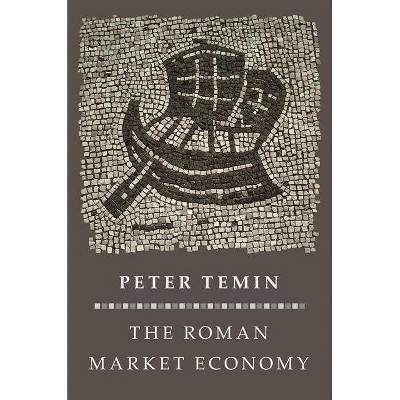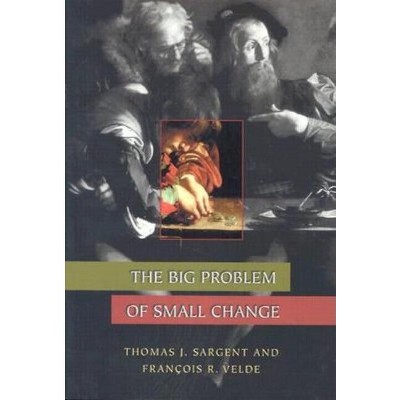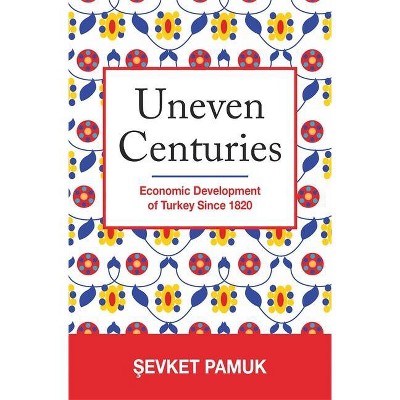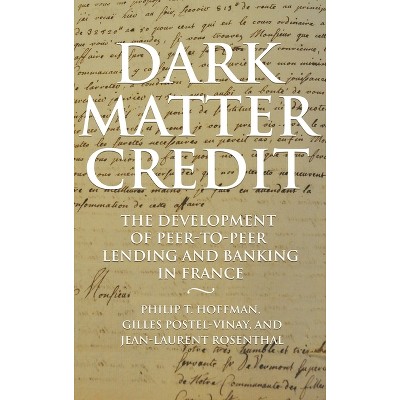Pliny's Roman Economy - (Princeton Economic History of the Western World) by Richard Saller (Paperback)

$27.95 when purchased online
Target Online store #3991
About this item
Highlights
- The first comprehensive study of Pliny the Elder's economic thought--and its implications for understanding the Roman Empire's constrained innovation and economic growth The elder Pliny's Natural History (77 CE), an astonishing compilation of 20,000 "things worth knowing," was avowedly intended to be a repository of ancient Mediterranean knowledge for the use of craftsmen and farmers, but this 37-book, 400,000-word work was too expensive, unwieldy, and impractically organized to be of utilitarian value.
- About the Author: Richard P. Saller is the Kleinheinz Family Professor of European Studies in the Department of Classics at Stanford University.
- 216 Pages
- Business + Money Management, Economic History
- Series Name: Princeton Economic History of the Western World
Description
About the Book
"Recent works by economic historians of early modern Europe have argued for a link between encyclopedias of the 18th century and the developments culminating in the Industrial Revolution. Diderot and D'Alembert's great Encyclopedie aimed to disseminate useful knowledge for productive growth and was one of the most visible contributions to what economic historian Joel Mokyr has labelled a "culture of growth." While the Ancient Romans didn't have anything like these encyclopedias, they did have its very popular and acknowledged ancestor, the thirty-seven books of Pliny's Natural History. Much has been written about Pliny's view of nature, his scientific thought, his ideology of empire, and so on, but there has been no comparable effort to probe Pliny's economic views and the impact, if any, of his history on Roman economic growth. In Pliny's Roman Economy, eminent Roman historian Richard Saller aims to bring together the economic observations and instances of financial reasoning scattered throughout the Natural History. Taken together, they do not amount to a discipline of "economics," but, Saller argues they do provide insights into Pliny's views about different forms of production and commerce, about labor and agency, about price formation and profitability, about investment and consumption and about technology. Combined with archaeological and other evidence, Pliny's work can also provide us with one of our best textual pictures of the working of the Roman economy"--Book Synopsis
The first comprehensive study of Pliny the Elder's economic thought--and its implications for understanding the Roman Empire's constrained innovation and economic growth
The elder Pliny's Natural History (77 CE), an astonishing compilation of 20,000 "things worth knowing," was avowedly intended to be a repository of ancient Mediterranean knowledge for the use of craftsmen and farmers, but this 37-book, 400,000-word work was too expensive, unwieldy, and impractically organized to be of utilitarian value. Yet, as Richard Saller shows, the Natural History offers more insights into Roman ideas about economic growth than any other ancient source. Pliny's Roman Economy is the first comprehensive study of Pliny's economic thought and its implications for understanding the economy of the Roman Empire. As Saller reveals, Pliny sometimes anticipates modern economic theory, while at other times his ideas suggest why Rome produced very few major inventions that resulted in sustained economic growth. On one hand, Pliny believed that new knowledge came by accident or divine intervention, not by human initiative; research and development was a foreign concept. When he lists 136 great inventions, they are mostly prehistoric and don't include a single one from Rome--offering a commentary on Roman innovation and displaying a reverence for the past that contrasts with the attitudes of the eighteenth-century encyclopedists credited with contributing to the Industrial Revolution. On the other hand, Pliny shrewdly recognized that Rome's lack of competition from other states suppressed incentives for innovation. Pliny's understanding should be noted because, as Saller shows, recent efforts to use scientific evidence about the ancient climate to measure the Roman economy are flawed. By exploring Pliny's ideas about discovery, innovation, and growth, Pliny's Roman Economy makes an important new contribution to the ongoing debate about economic growth in ancient Rome.Review Quotes
"Saller's book is truly interesting in many ways. Not only does it do justice to the existence of a reflection on economy in Western antiquity and to its few points of convergence with modern economic thought, but [it] also . . . raises a question that goes beyond antiquity: that of the conditions that make long-term economic growth and development possible, with a particular interest in cultural causes."---Etienne Helmer, Bryn Mawr Classical Review
About the Author
Richard P. Saller is the Kleinheinz Family Professor of European Studies in the Department of Classics at Stanford University. He is the author of Personal Patronage under the Early Empire and Patriarchy, Property, and Death in the Roman Family; the coauthor of The Roman Empire: Economy, Society and Culture; and the coeditor of The Cambridge Economic History of the Greco-Roman World.Dimensions (Overall): 8.43 Inches (H) x 5.43 Inches (W) x .63 Inches (D)
Weight: .6 Pounds
Suggested Age: 22 Years and Up
Number of Pages: 216
Series Title: Princeton Economic History of the Western World
Genre: Business + Money Management
Sub-Genre: Economic History
Publisher: Princeton University Press
Format: Paperback
Author: Richard Saller
Language: English
Street Date: December 5, 2023
TCIN: 89032806
UPC: 9780691229560
Item Number (DPCI): 247-13-3163
Origin: Made in the USA or Imported
If the item details above aren’t accurate or complete, we want to know about it.
Shipping details
Estimated ship dimensions: 0.63 inches length x 5.43 inches width x 8.43 inches height
Estimated ship weight: 0.6 pounds
We regret that this item cannot be shipped to PO Boxes.
This item cannot be shipped to the following locations: American Samoa (see also separate entry under AS), Guam (see also separate entry under GU), Northern Mariana Islands, Puerto Rico (see also separate entry under PR), United States Minor Outlying Islands, Virgin Islands, U.S., APO/FPO
Return details
This item can be returned to any Target store or Target.com.
This item must be returned within 90 days of the date it was purchased in store, shipped, delivered by a Shipt shopper, or made ready for pickup.
See the return policy for complete information.











